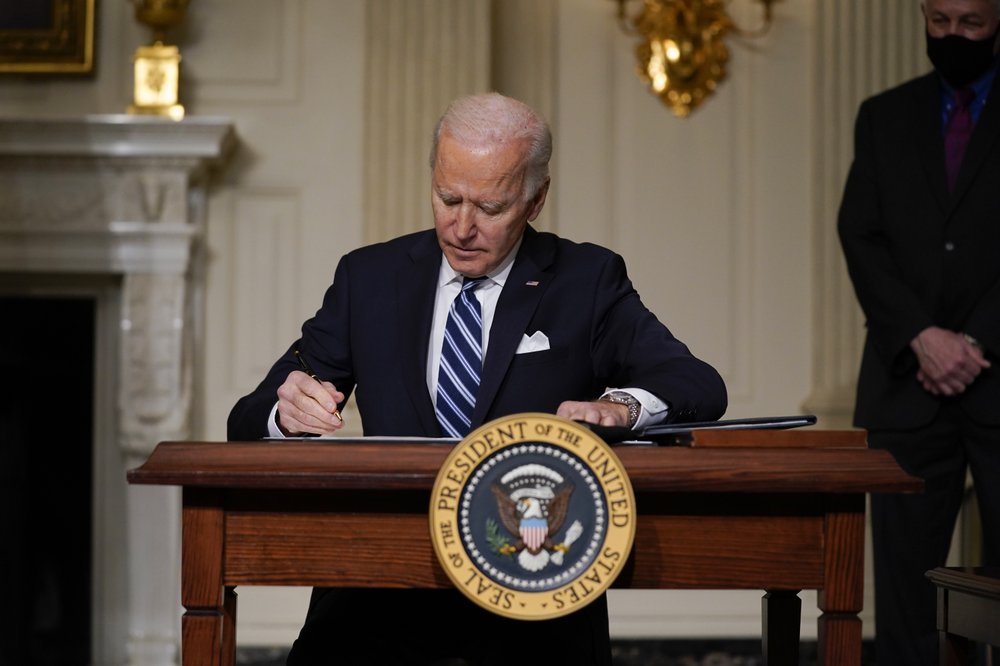Joe Biden, ‘We can’t wait any longer’ to address climate crisis

In the most ambitious U.S. effort to stave off the worst of climate change, President Joe Biden signed executive orders Wednesday to transform the nation’s heavily fossil-fuel powered economy into a clean-burning one, pausing oil and gas leasing on federal land and targeting subsidies for those industries. The directives aim to conserve 30 percent of the country’s lands and waters in the next 10 years, double the nation’s offshore wind energy, and move to an all-electric federal vehicle fleet, among other changes. Biden’s sweeping plan is aimed at staving off the worst of global warming caused by burning fossil fuels. But his effort also carries political risk for the president and Democrats as oil- and coal-producing states face job losses from moves to sharply increase U.S. reliance on clean energy such as wind and solar power. “We can’t wait any longer″ to address the climate crisis, Biden said at the White House. ”We see with our own eyes. We know it in our bones. It is time to act.″ He said his orders will “supercharge our administration’s ambitious plan to confront the existential threat of climate change.” Biden has set a goal of eliminating pollution from fossil fuel in the power sector by 2035 and from the U.S. economy overall by 2050, speeding what is already a market-driven growth of solar and wind energy and lessening the country’s dependence on oil and gas. The aggressive plan is aimed at slowing human-caused global warming that is magnifying extreme weather events such as deadly wildfires in the West and drenching rains and hurricanes in the East. Biden acknowledged the political risk, repeatedly stating his approach would create jobs in the renewable energy and automotive sectors to offset any losses in oil, coal, or natural gas. “When I think of climate change and the answers to it, I think of jobs,″ Biden said. “These aren’t pie-in-the-sky dreams. These are concrete actionable solutions. And we know how to do this.″ In a change from previous administrations of both parties, Biden also is directing agencies to focus help and investment on the low-income and minority communities that live closest to polluting refineries and other hazards, and the oil- and coal-patch towns that face job losses as the U.S. moves to sharply increase its reliance on wind, solar and other energy sources that do not emit climate-warming greenhouse gases. Biden pledged to create “millions of good-paying, union jobs” building electric cars, installing solar panels and wind turbines, and performing specialized work to cap abandoned wells, restore mine-scarred land and turn old industrial sites “into the new hubs of economic growth.″ Even so, Republicans immediately criticized the plan as a job killer. “Pie-in-the-sky government mandates and directives that restrict our mining, oil, and gas industries adversely impact our energy security and independence,″ said Rep. Cathy McMorris Rodgers of Washington state, the top Republican on the House Energy and Commerce Committee. Biden also is elevating the warming climate to a national security priority, directing intelligence agencies, the military, and others to do more to prepare for the heightened risks. The conservation plan would set aside millions of acres for recreation, wildlife, and climate efforts by 2030 as part of Biden’s campaign pledge for a $2 trillion program to slow global warming. President Donald Trump, who ridiculed the science of climate change, withdrew the U.S. from the Paris global climate accord, opened more public lands to coal, gas, and oil production, and weakened regulation on fossil fuel emissions. Experts say these emissions are heating the Earth’s climate dangerously and worsening floods, droughts, and other natural disasters. Currently, 61% of the nation’s electric power comes from natural gas and coal, 20% from nuclear, and 17% from wind, solar and other renewable energy, the U.S. Energy Information Administration says. Georgia Tech climate scientist Kim Cobb said that “if this Day 7 momentum is representative of this administration’s 4-year term, there is every reason to believe that we might achieve carbon neutrality sooner than 2050,” even as key roadblocks lie ahead. Biden’s actions came as his nominee for energy secretary, former Michigan Gov. Jennifer Granholm, faced deep skepticism from Republicans as she tried to pitch the president’s vision for a green economy. “The last Democratic administration went on a regulatory rampage to slow or stop energy production,” said Wyoming Sen. John Barrasso, a leading Republican on the Senate Energy and Natural Resources Committee. “I’m not going to sit idly by … if the Biden administration enforces policies that threaten Wyoming’s economy.″ Granholm, whose state was devastated by the 2008 recession, promoted emerging clean energy technologies, such as battery manufacturing, as an answer for jobs that will be lost as the U.S. transitions away from fossil fuels. Former Secretary of State John Kerry, now Biden’s climate envoy, said oil, gas, and coal workers “have been fed a false narrative″ that ”somehow, dealing with climate is coming at their expense. No, it’s not. What’s happening to them is happening because of other market forces already taking place.″ Instead of possible black lung disease, a miner would have a brighter future as a solar power technician, Kerry said. “The same people can do those jobs, but the choice of doing the solar power one now is a better choice.″ The oil industry said curtailing domestic production will lead to an increase in imported oil. “I don’t think any American wants to go back to the days of being held hostage to foreign entities that don’t have America’s best interest at heart as we lose American energy leadership,” said Mike Sommers, president of the American Petroleum Institute. Sommers and other industry leaders warned that states could lose hundreds of thousands of jobs and critical funding. Nearly one-third of New Mexico’s state budget comes from oil and gas, said Ryan Flynn, president of the New Mexico Oil and Gas Association. Biden’s directive to double energy production from offshore wind comes after the Trump administration slowed permit review of some giant offshore wind turbine projects. Significantly, he is directing agencies
Alabama becomes latest state to detect COVID-19 variant

The more highly transmissible COVID-19 variant first detected in the United Kingdom has infected three people in Alabama, state health officials said Wednesday. The variant was found in two children and one adult, the state heath department said in a statement. Two cases are in Montgomery County and one is in Jefferson, the statement said. The variant is thought to be more contagious, although health officials say it has not definitively been shown to be more virulent. It also has been detected in at least 24 other states, including Florida, Georgia, North Carolina and Tennessee. The variant was first detected in the U.K. late last year. “Given that the U.K. variant has already been detected in most of the states that surround Alabama, it is not surprising that it has finally been detected here,” said State Health Officer Scott Harris. “The U.K. variant is not known to further increase the risk of serious illness or death beyond our original strain, but it is easier to transmit, and so we are simply encouraging Alabamians to continue those practices that keep everyone safe, such as masking, social distancing and hygiene.” Infectious disease experts and the Centers for Disease Control and Prevention have indicated that the current vaccine should be effective against the U.K. strain, but it is still being studied, state health officials said. Republished with the permission of the Associated Press.
Executive order to stop private prisons won’t block Kay Ivey’s prison lease plan

President Joe Biden signed an executive order Wednesday to phase out the Department of Justice’s use of private prisons. The order began under the Obama administration and comes from an effort to address racial inequality and to make good on a promise to Black Americans, who helped Biden win the presidential election. According to an NBC report, the order that was stopped by the Trump administration in 2017 now asks the Justice Department to decline to renew contracts with privately-operated, for-profit prisons. John Pfaff, a Fordham University School of Law professor, stated, “When it comes to private prisons, the impact of this order is going to be slight to none. This is not about shrinking the footprint of the federal prison system, it’s just about transferring people to public facilities. Biden is telling an executive agency under his control what kind of contracts they can enter, that’s a core executive function of Biden’s.” Pfaff went on to comment that states can still choose “who to write contracts with. In practice, this will end up being more symbolic and will have little impact on any issue of racial justice and the system. The symbolism carries the very real risk of making us blind to the nearly identical incentives of the public prison sector, and the public side is so much vaster in scope.” State Auditor Jim Zeigler stated the Biden order will not block a plan by Alabama Gov. Kay Ivey to contract with private firms to build three super prisons. The state plans to lease the prisons from these private firms for 30 years. Alabama has in recent months been looking into ways to alleviate prison overcrowding and other dangers. According to an NPR report, in December, Alabama was sued by the Justice Department, alleging dangerous and unconstitutional conditions in the state’s prisons. Ivey released her plan to build the super prisons soon after. Zeigler stated, “The Biden order does not apply to the Ivey plan for two reasons. First, the order applies only to federal prisons and federal contracts with prisons. Second, the Ivey plan is not for privately-run prisons but for private construction, private ownership, and state leasing of the private prisons. The state Department of Corrections would run the prisons.” In a recent opinion piece, Zeigler called for an independent management audit of Alabama’s Department of Corrections. The state would pay $88 million in rent for 30 years – a total of $2.6 billion. Zeigler says, “At the end of 30 years, the state would own equity in the prisons of zero. State taxpayers would have to start over and pay for the prisons a second time.” A 2016 Federal Bureau of Prisons report found that private prisons see “high rates of assault, use of force incidents and lockdowns. Biden stated that the order was “the first step to stop corporations from profiting off of incarceration that is less humane and less safe.” Ivey is expected to sign contracts with the private prison construction firms within days.
Protected or Prisoners: AARP Podcast “The Perfect Scam” takes on guardianship abuse

AARP recently launched a new podcast series, “The Perfect Scam.” The series features author and journalist Bob Sullivan and Frank Abagnale, a fraud expert with over 40 years of experience advising the FBI and lecturing about embezzlement & forgery. Abagnale’s criminal (mis)adventures were featured in the movie Catch Me if You Can. In this past week’s must listen to (or if like me, you’re more a reader, must-read) episode “California man almost loses his stepmother in guardianship dispute,” Sullivan and Abagnale take on the issue of guardianship and conservatorship abuse with a slew of guests to discuss the issue. The episode highlights a California guardianship case, previously covered in detail by an AARP Magazine story. The podcast and article highlight the story of a man and his step-mother who found themselves in the center of a court-ordered guardianship that cost her precious time and both of them over a hundred and fifty thousand dollars. AARP succinctly noted at the time, “A court-ordered guardianship nearly shattered Kise Davis’ life, in a trend that too often leads to isolation and exploitation of older Americans.” In that case, Mrs. Davis was already showing signs of early dementia but was in frequent contact with her step-son, with whom she had no formal or legal ties, Larry Davis. Larry worried about her health and was already looking into options to have her moved closer to him, going so far as to have his stepmother assessed by a social worker. The assessment stated she was capable of living on her own, as did a subsequent evaluation done just before the court-ordered conservatorship. In the time before the case, Mrs. Davis gave her power of attorney to her handyman (after having previously given it to her son, then a friend, and then back to her son). After realizing, as he put it, he was “in over his head,” the handyman reached out to an attorney who then told him to contact the court system. He then petitioned to have a guardian put into place for Davis, an order that was granted. According to the AARP story, “Kise’s newly appointed guardian, a company called Advocate Services of Las Cruces, had placed her in a dementia-care facility by order of the court. It took Larry more than a week to reach her there. When they finally spoke, on Christmas Eve, she seemed to believe she’d booked herself a room, though now they wouldn’t let her go. “They’ve put me in an insane asylum,” she told him, weeping. “Please come and get me out of here.” According to several published reports, details of the case diverge around the time of the court order based on who you speak to. This is not uncommon in cases, even with early-onset dementia, as those at the center can give conflicting information to those in their lives. One thing is clear: Mrs. Davis’s dementia, which included some form of paranoia, was progressing, and she could use more oversight than she was getting at the time of the court-ordered conservatorship. The issue at hand being could the son have been made aware earlier of what was happening with his loved one and, additionally, when he came forward to intervene on her behalf, should the court have moved more promptly in giving him control. It took him an astonishing 14-months for the court system to right the wrong and make him his step-mother’s caregiver. In Feb. 2018, AARP reported, “At 87, Kise is physically healthy, and Larry hopes she’ll remain so. But her freedom came at a considerable cost. He spent more than $50,000 on legal bills and other expenses; the charges to Kise’s estate during her ordeal are expected to top $140,000. And that’s not counting the existential toll. “They took 14 of Kise’s last months away from her and made it a nightmare,” says Larry, who testified before New Mexico’s guardianship commission at last year’s hearings. “It was like a hostage situation. No one should have to go through what happened to us.” A sentiment I have repeated in print and on-air throughout this series. During my short time personally investigating cases throughout Alabama and reading about dozens of others nationally, I’ve learned that many, if not most guardianship and conservatorship cases involve the exploitation of seniors with memory problems and early-onset dementia. Courts like to err on the side of caution in their efforts to “protect” the vulnerable, frequently leaving them and their assets vulnerable to those seeking to abuse the system. Exploiters of the court system and physicians they work in concert with (sometimes knowingly, sometimes unknowingly) overstate the problems facing a ward or potential ward. I cannot overstate the potential for problems in a system in which the “protectors,” be it doctors, nursing homes, guardians, and others, are given more money and/or control based on findings of memory issues. Courts, either through laziness, ineptness, busyness, or even corruption itself, have been increasingly quick to sign off on taking away the rights and freedom of those brought before them, a problem we should all be in a hurry to address. The podcast highlights a few public cases of fraud that have occurred throughout the nation. I wanted to link to those stories to add details and context to the events and to the ease and length of the deception by bad actors in the system. Rebecca Fierle of Ocala, FL, is currently facing charges brought in Feb. of 2020. A Spectrum News13 report at the time of her arrest said the following: “State agents arrested Fierle on Monday in Marion County, where she lives. Records show Fierle was booked into the Marion County Jail at about 6:30 p.m. The Florida Department of Law Enforcement said that Fierle was charged with aggravated abuse of an elderly person and neglecting an elderly person on a warrant out of Hillsborough County. The arrest was connected to the death of 74-year-old Steven Stryker, a Brevard County man who died


